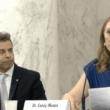Revenge politics: a loss for the American public
March 29, 2017
President Barack Obama left a surprisingly deep legacy of policies designed to reduce US emissions of the greenhouse gases that are causing global climate disruption. However, because of obstructive Republican attitudes to such efforts, none of the policies are enshrined in legislation. They all came about as a result of one or another form of executive action. Thus there was always a risk that a less-climate-friendly president would seek to undo them, and that is precisely what is happening now, in spades.
Make no mistake, President Trump’s actions have nothing to do with restoring coal mining jobs (which have been lost to automation and good old free-market competition with superior energy sources), American jobs in general, competitiveness, or energy independence. Most of the policy changes undertaken in Trump’s latest executive order on climate, as well as earlier orders, in fact do harm to the American economy and nothing to promote more secure energy supplies. They are not pro-anything, but practically seek to make a virtue of trashing the climate by burning as much fossil fuel as possible, even if it costs the economy more to do so. For example, when health and environmental effects are factored in, burning coal represents a net cost to the economy. Really, it’s just revenge politics—an infantile need to shred Obama’s legacy—with a lot of pandering to a dwindling base thrown in for bad measure. The actual interests of the nation take a distant back seat.
Among the policies announced in the latest executive order, the lifting of the moratorium on coal leasing on federal lands will have the least effect. Coal demand is in free fall worldwide, especially with China moderating its coal use, and heavy competition from wind and natural gas, so there is little appetite for bankrupt coal companies to take on major new commitments.
Two other actions—the directive to revise (read “lower”) the social cost of carbon used in figuring the impact of regulations, and to more broadly eliminate climate as a factor in environmental impact reviews under the National Environmental Policy Act—are potentially more consequential. Both measures will remove barriers to projects that increase carbon dioxide emissions, though both will be vigorously fought in court. The social cost of carbon represents an estimate (in monetary terms) of the damage done by emitting carbon dioxide, and is a key factor in the cost-benefit analyses used in regulatory review.
Setting in motion the long, drawn-out process of eviscerating Obama’s Clean Power Plan has rightfully garnered a lot of attention, and will lead to some interesting court arguments as states that are in favor of the plan defend it against Trump’s attempts to weaken it. If Trump succeeds, he will probably delay the retirement of some creaky old power plants, but a victory is unlikely to lead to the building of many more coal-fired plants—unless Trump takes the radical action of actually subsidizing the burning of coal (not yet proposed, but I wouldn’t put it past him).
The most consequential environmental onslaught is not part of the latest executive order. On March 16, Trump announced his intention to roll back the next round of Obama-era automotive fuel economy standards. This could have a very serious effect on US emissions. Until 2013, US transport-related emissions had been declining, but since then, despite more stringent efficiency standards, the oil price collapse has led to a marked rise in consumption, and emissions are nearly back to their peak 2008 level. Transportation has now surpassed power generation as the biggest contributor to US emissions. Car companies seeking short-term profits from sales of giant SUVs have foolishly and immorally allied themselves with Trump’s agenda, having thoroughly forgotten how recently they had to be bailed out of near-bankruptcy owing to their inability to compete in the arena of energy-efficient vehicles. They’ll be back at the trough the minute oil prices swing around again, as they inevitably will.
Trump’s climate-hatred actions are indeed fulfilling what he campaigned on, but so did Obamacare repeal. Once people realized what they were actually getting, there was open rebellion. Trump is a LOSER. He showed that on health care, and once the American people realize the snake-oil they’ve been sold in the guise of “jobs and energy independence,” he will be a LOSER on climate as well. It’s only a question of how much damage he does before he ultimately loses.
Raymond T. Pierrehumbert
Halley Professor of Physics
University of Oxford













